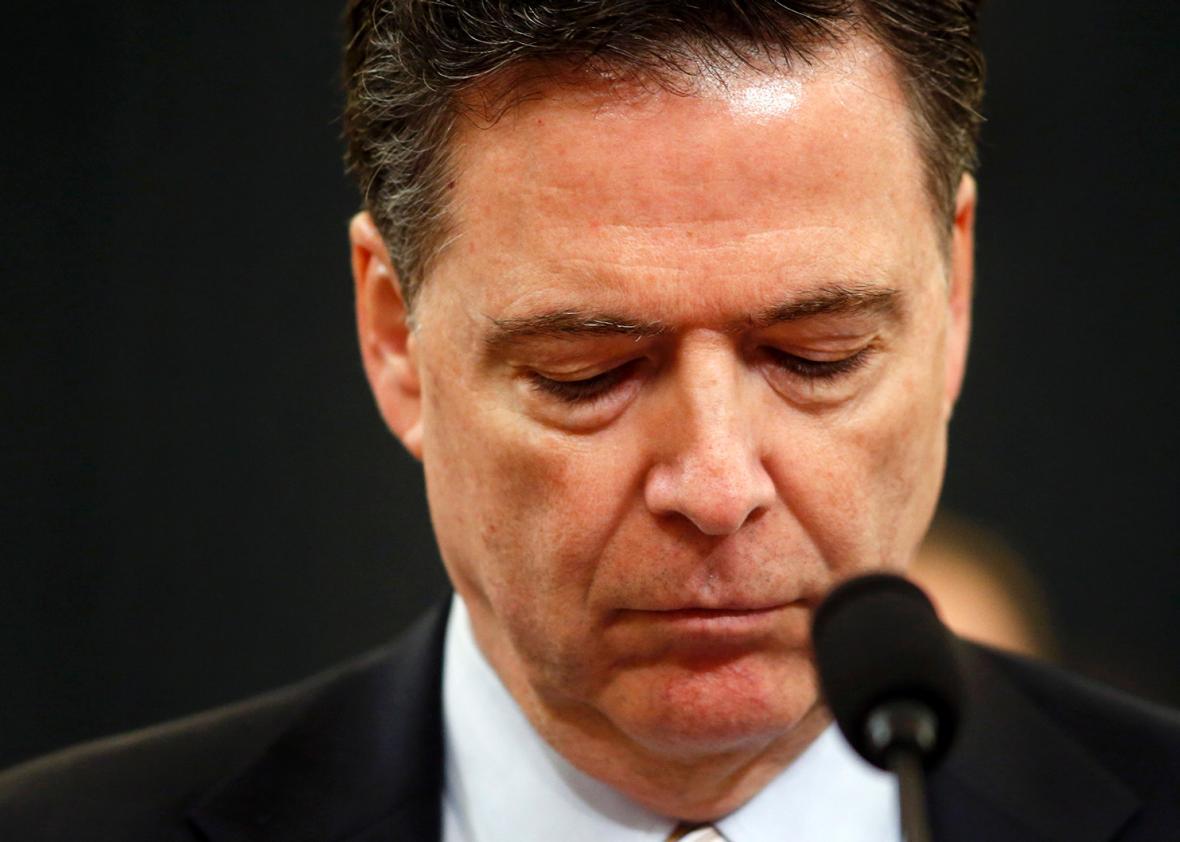It’s difficult to describe the feeling of seeing the president of the United States lie, in the moment, about ongoing events and testimony. To watch the White House declare that you should believe it over your lying eyes, even as you witness reality unfold in real time. It’s not the usual spin or political dishonesty; it feels transgressive, like some critical line has been crossed, and a new world entered where Donald Trump and his allies contest the nature of truth itself, with the presidency as their platform for action.
That’s exactly what happened, on Monday, during a hearing of the House Intelligence Committee. Testifying on alleged Russian interference in the 2016 presidential election, FBI Director James Comey confirmed the existence of an investigation into that interference and the Trump campaign itself. “I have been authorized by the Department of Justice,” Comey said, “to confirm that the FBI, as part of our counterintelligence mission, is investigating the Russian government’s efforts to interfere in the 2016 presidential election, and that includes investigating the nature of any links between individuals associated with the Trump campaign and the Russian government and whether there was any coordination between the campaign and Russia’s efforts.” Comey also affirmed the view that Russia favored Trump with this interference. “I think that was a fairly easy judgment for the community,” he said. “Putin hated Secretary Clinton so much that the flip side of that coin was he had a clear preference for the person running against the person he hated so much.”
Insofar that normal people watch congressional hearings, any casual viewer would have read this as confirmation of election “hacking” and undue influence from the Russian government. But President Trump, perhaps interested in shaping the narrative of this hearing and investigation, offered a different interpretation on Twitter, through the official POTUS account. “The NSA and FBI tell Congress that Russia did not influence the electoral process,” he said, adding a brief clip of the hearing for readers to watch.
This wasn’t true. In that clip, Rep. Devin Nunes, chair of the Intelligence Committee, asked Adm. Mike Rogers, the director the National Security Agency, if he had any evidence that Russia tampered with vote totals in the state of Michigan. Rogers answered no. Nunes then asked the same question for the states of Pennsylvania, Wisconsin, Florida, North Carolina, and Ohio—all swing states in the presidential election. Rogers, again, answered in the negative. “I have nothing generated by the National Security Agency,” he said. Comey answers similarly, telling Nunes there’s no evidence from the FBI that the Russian government had tampered with actual votes.
In fact, conspiracy theorists aside, no one argues otherwise. The actual allegation is more limited: That, as ranking Democrat Adam Schiff asserted in his opening statement to the committee, “A foreign, adversarial power intervened in an effort to weaken our democracy, and to influence the outcome for one candidate and against the other.” That intervention, Schiff argued, was hacked data, “weaponized” and disseminated through “existing third-party channels like WikiLeaks.” To deny vote-hacking, in other words, is not to preclude outside interference. Nunes’ questioning is besides the point, and Trump’s interpretation of that questioning is dishonest.
This lying was so brazen that it almost overshadowed the outright debunking from Trump’s earlier claim that President Obama had “wiretapped” him during the campaign. “With respect to the president’s tweets about alleged wiretapping directed at him by the prior administration, I have no information that supports those tweets, and we have looked carefully inside the FBI,” said Comey. Likewise, said Rogers, “We know there was not a wiretap on Trump Tower. However, it’s still possible that other surveillance activities were used against President Trump and his associates.” In fact, the election lie was so brazen that Comey was asked to refute it in real time, which he reluctantly obliged.
Thus far, in the past few weeks, Trump has forced American intelligence agencies to investigate a conspiracy theory with almost no basis in fact, while using his platform to discredit an actual inquiry into his campaign and administration. He’s accused an allied government of surveillance, and if recent reporting is any indication, he is convinced of the reality of a wiretapping plot, despite all evidence to the contrary. It’s extraordinary behavior, compounded by the fact that Trump lies with unprecedented ease and frequency.
This, in the end, is what’s so disturbing about his Monday afternoon tweet. It’s another sign of Trump’s basic contempt for the idea of an independent, observable reality that stands as a baseline for his actions. That reality is how you hold politicians accountable; it’s why the press is vital to a free and healthy democracy. But Trump sees no advantage in accountability, no reason to honor the truth or even gesture toward its existence. Both he and his White House have made a conscious decision to destabilize public discourse, to fracture and undermine common understanding. President Trump isn’t just lying to the American people; he’s saying, almost openly, that the truth just doesn’t matter either way.
